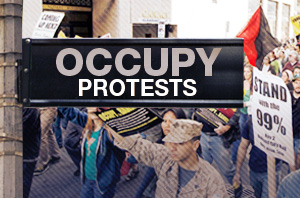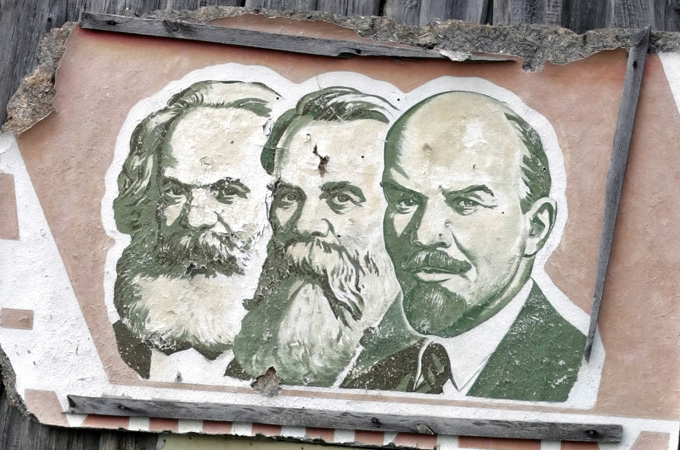A Philosophy for the Protesters
The OWS movement grew out of the philosophical paradox that our financial system could not contain flaws.Santiago Zabala, Nov. 30, 2011
AlJazeera.com
Barcelona, Spain - A few weeks ago, after participating at a conference at Stony Brook University in New York, I went to Zuccotti Park to see and support the protesters there. A few months earlier, I had done the same thing, but in Placa de Catalunya in Barcelona; in both parks, where similar dissatisfaction with our world order was being expressed, the only thing I could think of was the actuality of Karl Marx's words of 1845: "Philosophers have only interpreted the world in various ways; the point is to change it". How can these words still be valid today? Is there a philosophy for these protesters?
Regardless of all the great work that philosophers have done since
Marx, this change has still not come about. The reason does not rest in
philosophers' inability to interpret correctly, but rather in their
desire to interpret correctly. The inability to effect change that
concerned Marx cannot be attributed to interpretation but to the truth
that interpretation seeks, that is, to descriptions. Descriptions demand
the imposition of certain truth and the conservation of reality, the
status quo. Interpretation, on the other hand, constantly makes new
contributions to reality, constantly produces change. Marx's call to
change the world should be read against those philosophies incapable of
producing change, those that sustain the current constitution of
society, politics and, most of all, the economy. These philosophies are
primarily practiced in the United States under the name of
"metaphysical" or "analytical" philosophy, and star representatives
include, among others, Robert Nozick, Francis Fukuyama and John Searle.
While Nozick and Fukuyama defend neoliberalism and its triumph over
history, Searle (who was honoured
by George W. Bush in 2004 with a National Humanities Medal) focuses on a
defence of reason and objectivity and so acts to conserve the current
condition of the world.
 In the midst of our global economic crisis, which sees financial
centres such as Wall Street occupied by protesters who call for change,
Marx's statement points out that we are still framed within the thought
system that sustains the crisis, but it also demands a change in
thought, that is, a philosophy for these same protesters. This
philosophy is available and is called hermeneutics, the philosophy of
interpretation that runs proximally through history from Aristotle and
Augustine to Paul Ricoeur and Hans-Georg Gadamer. Although Plato in the Ion presented
hermeneutics as a theory of reception and practice for transmitting the
messages of the gods of Olympus, it soon after acquired a broader
philosophical significance, suggesting alternative vital meanings for
world, thought and existence. Thus, its most important living
representative, Gianni Vattimo, recently pointed out how "whoever does
not succeed in becoming an autonomous interpreter, in this sense,
perishes, no longer lives like a person but like a number, a statistical
item in the system of production and consumption". The protesters and
movements that arose in Spain last spring and have now spread throughout
the world are the incarnation of these autonomous interpreters
determined to overcome the economic impositions established by our
governments. But what grants them this determination is not possession
of a higher truth than the one espoused by the bearers of power, but
rather the idea of an alternative and socially balanced organisation of
wealth, that is, a different interpretation of the world.
In the midst of our global economic crisis, which sees financial
centres such as Wall Street occupied by protesters who call for change,
Marx's statement points out that we are still framed within the thought
system that sustains the crisis, but it also demands a change in
thought, that is, a philosophy for these same protesters. This
philosophy is available and is called hermeneutics, the philosophy of
interpretation that runs proximally through history from Aristotle and
Augustine to Paul Ricoeur and Hans-Georg Gadamer. Although Plato in the Ion presented
hermeneutics as a theory of reception and practice for transmitting the
messages of the gods of Olympus, it soon after acquired a broader
philosophical significance, suggesting alternative vital meanings for
world, thought and existence. Thus, its most important living
representative, Gianni Vattimo, recently pointed out how "whoever does
not succeed in becoming an autonomous interpreter, in this sense,
perishes, no longer lives like a person but like a number, a statistical
item in the system of production and consumption". The protesters and
movements that arose in Spain last spring and have now spread throughout
the world are the incarnation of these autonomous interpreters
determined to overcome the economic impositions established by our
governments. But what grants them this determination is not possession
of a higher truth than the one espoused by the bearers of power, but
rather the idea of an alternative and socially balanced organisation of
wealth, that is, a different interpretation of the world.
But the parallel I am trying to establish between our protesters and
the philosophy of interpretation does not rest simply on their demand
for change but also on the condition in which they find themselves. Both
the protesters and hermeneutics exist at the margins of society, as a
sort of discharge of capitalism, on the one hand, and a second-rate
philosophy, on the other. This marginalised condition is a consequence
not of political or theoretical inconsistence, but rather of their vital
ethical demands. Like Marx, hermeneutic thought and the protesters pose
a radical demand for change. Rarely do people comfortable in their
lives propose a different interpretation of reality, but when they do,
it becomes politically revolutionary because it opposes the objective
state of affairs that conditioned his previous existence. The demands of
our protesters in Barcelona, New York and Sydney vary from equal
distribution of income, greater social services, to reduction of
corporations influence on politics, but this does not indicate they are
conflicting, confused, and anarchic but that they are all hungry for
change. But why is hermeneutics the most appropriate philosophy for
these protesters who seek to change real economic policies?
 |
| Joseph E. Stiglitz |
Santiago Zabala is ICREA Research Professor at the University of Barcelona. His books include The Hermeneutic Nature of Analytic Philosophy (2008), The Remains of Being (2009), and, most recently, Hermeneutic Communism (2011, co-authored with Gianni Vattimo), all published by Columbia University Press. His webpage is www.santiagozabala.com
The views expressed in this article are the author's own and do not necessarily reflect Al Jazeera's editorial policy.



2 commenti:
piu che un commento vorrei un informazione,perdoni se uso uno spazio destinato ad altro ma non sapevo dove fare la mia richiesta,vorrei sapere se la pubblicazione delle sue opere presso Meltemi prosegue oppure no;non ho piu visto titoli in uscita da un po.
Grazie, Fabrizio Massa
Caro Fabrizio, la casa editrice ha avuto dei problemi finanziari (e chi non li ha?), e le Opere complete non sono, probabilmente, tra le cose più appetibili sul mercato editoriale, per il pubblico. Insomma... vedremo. Nel frattempo, vedrò di pubblicare qualcosa di nuovo!
Posta un commento